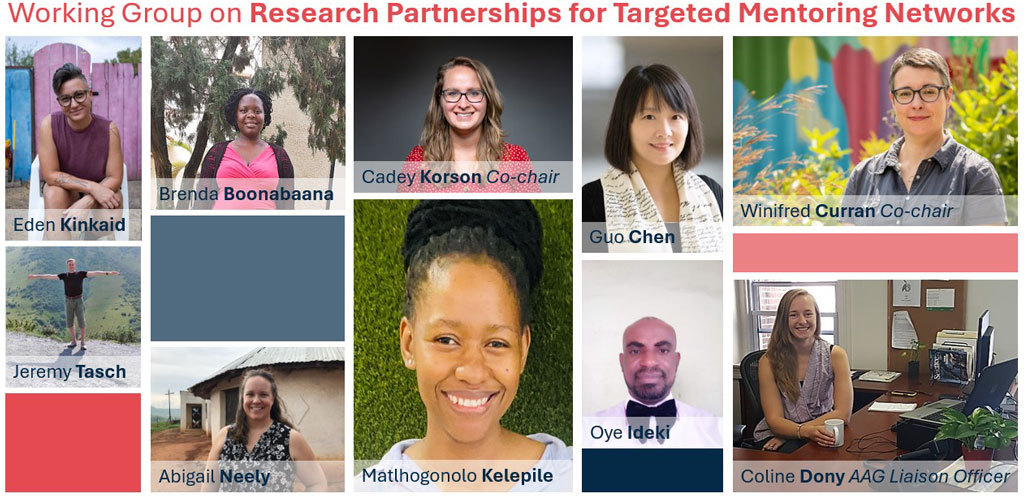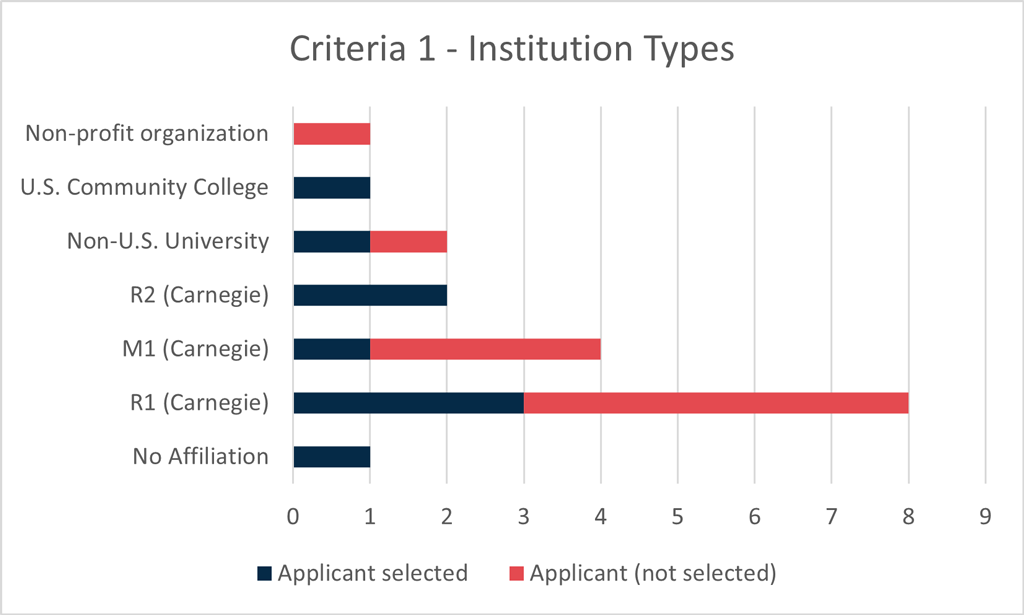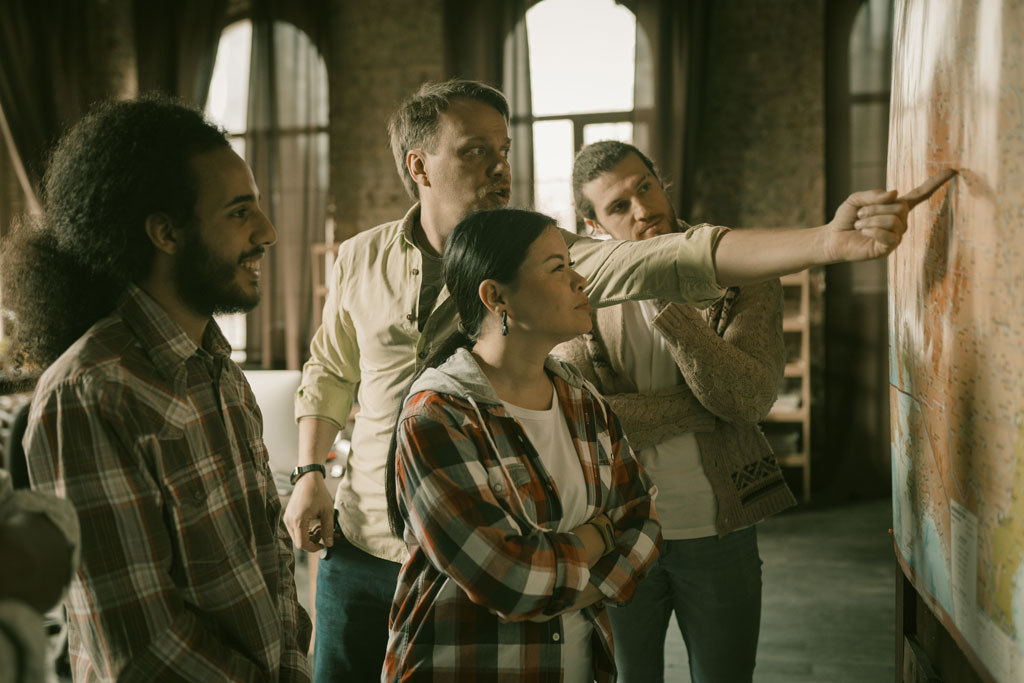- Overview
- Targeted Mentoring
- Request for Partnerships
- Who Can Partner
- Partnership Funding
- How to Respond
- Review Process
- More Details
- Acknowledgements
When we think of the term “mentoring,” the most common image we envision is a mentor and a mentee facing each other at a table and discussing approaches to advance the mentee’s career. AAG wants to envision new ways of mentoring; a pressing need and a step towards a Culture of Care at AAG.
This Request for Partnerships (RFP) is the first in AAG’s new Research Partnerships Initiative.
Targeted Mentoring Networks
A Targeted Mentoring Network (TMN) focuses on narrower aspects and experiences of a specific career pathway. Below are only a few examples of TMNs we envision already existing or needing to be initiated:
- Women pursuing a degree in the geosciences
- Non-tenure-track faculty in the geohumanities
- Spatial data scientists in the tech industry
- Faculty pursuing research grants for the first time
- Geography students living with a visual impairment
- Genderqueer geography scholars
- HBCU GIScience students
- International geography students in the U.S.
- Latinx tenure track faculty in geography
- Tenured women of color in Geography
- Neurodiverse geography students
These TMNs allow participants to acknowledge certain aspects of their career’s identity, positionality, or intersectionality and discuss strategies and challenges in the specificity they need to carve their path forward where they are at. Plus, geographers who are typically underrepresented on their career path would also benefit from support in terms of advocacy alongside more common mentoring topics.
Career paths cross and combine several disciplines or sectors, and career “ladders” aren’t as straightforward anymore. Finding guidance through the unbeaten pathway requires more than one mentor. Geographers will be able to connect to any number of TMN they identify with, helping them build their “Mentor Map.”
Request for Partnerships
AAG wants to initiate several partnerships to initiate TMNs and mentor geographers across the geography spectrum, different career stages, and/or identities, positionalities, or intersectionalities.
What role would AAG expect from a partner?
AAG is looking for partners who have knowledge, skills, and experiences that make them well-positioned to coordinate the activities of mentors and mentees, and to lead the development of mentoring approaches and resources that are fitting and effective for a specific group in Geography. For example, some TMNs may discuss career advancement in a group format (rather than one-on-one mentoring), and other TMNs may focus heavily on (self-) advocacy as an integral and non-negligible part of effective mentoring. A partner can either:
- Build on an existing mentoring program (whether formal or informal) – this would be a program that already serves (or served) a part of the geography community with mentoring, but that could benefit from a partnership with AAG.
- Initiate a Targeted Mentoring Network – this would be for a subset of geographers that have a clear need for mentoring, for whom mentoring is limited or not available yet.
What role is AAG well-positioned to take in a partnership?
- Connecting geographers across institutions – AAG will connect geographers across fields, career stages, institutions, sectors, and/or internationally, and increase the odds of finding mentors.
- Increasing the visibility of networks – AAG will advertise all TMNs in one place so that geographers can connect to the ones they identify with.
- Supporting the operational sustainability of networks – AAG will offer a set of standard operational support across TMNs to ensure continuity with new TMN leaders.
- Evaluating mentoring outcomes – Since TMNs are more targeted, it will not be possible for them to evaluate (based on feedback from their network alone) whether their network’s mentoring is effective compared to mentoring outcomes across fields, career stages, identities, positionalities, and intersectionalities in Geography. AAG will coordinate consistent evaluation across TMNs (see more detailed evaluation framework below).
- Facilitating a Learning Organization across networks – AAG will bring together TMN leaders and have them exchange practices, resources, and for AAG to share outcomes and findings from the evaluation across TMNs.
- Supporting funding development and management – AAG is prepared to work with and train partners who may not have experience developing funding applications or leading grants, but who have clear leadership and ideas for these efforts.
Who can respond to this Request for Partnerships?
We encourage submissions by a Partner Team that can be composed of one or more:
- Individual Member(s) of AAG – You have experience leading mentoring activities or have had sufficient mentoring experiences (positive or negative), or you wish you would have had a TMN that focused on part of your career field, stage identity, positionality, or intersectionality.
- Representative(s) of an AAG Member Group – You may represent an AAG Committee, Specialty or Affinity Group, or other member group, and have ideas on how to continue or initiate a TMN.
- Representative(s) of Organizations Related to this Effort– You may represent an organization that serves part of the geography community or has experience with effective mentoring.
How will the partnership be funded?
To sustain these TMNs, AAG is eager to pursue funding opportunities with partners to cover costs incurred by the Partner Team, which may include (1) fair compensation for coordinating mentoring activities and/or for developing mentoring approaches and resources, and (2) costs associated with training mentors and/or onboarding mentees (e.g., travel, honoraria, etc.), and (3) indirect costs needed to receive grant support at their institution (when applicable); and costs incurred by AAG, which may include AAG staff support and indirect costs needed to fulfill AAG’s role in the partnership.
We want to make explicit that we are still eager to see you lead or be part of the Partner Team if:
- You are not affiliated with any institution at this time, but are actively engaged within AAG.
- You are affiliated with an institution that does not typically pursue funding, or that does not require your position to pursue funding.
- You are unsure whether your institution could submit or accept funding for this effort.
- You do not have experience with funding development or grant leadership.
We acknowledge the systemic issues that are causing some to be in a position to pursue external funding and/or to have experience with external funding and some to have none.
Responding to this Request for Partnerships (RFP) is not a commitment to a partnership with AAG, but the start of a conversation to discuss what a feasible partnership might look like for both you, and AAG.
Potential funding sources
The list below is an initial list of funding sources that could be fitting for AAG to pursue with a partner depending on the TMN they are eager to develop. We are also open to partners suggesting funding sources to us.
- Early Career Development and Mentoring Program for Education Research by the Institute for Education Sciences
- Early Career Development and Mentoring Program for Faculty at Minority Serving Institutions by the National Center for Education Research
- Tribal Colleges and Universities Program (TCUP) by the National Science Foundation
- Historically Black Colleges and Universities – Excellence in Research (HBCU – EiR) by the National Science Foundation
- Growing Research Access for Nationally Transformative Equity and Diversity (GRANTED) by the National Science Foundation
- Institutes for Higher Education Faculty by the National Endowment for the Humanities
- Higher Learning by the Mellon Foundation
- Right to the Discipline by the Antipode Foundation
If you know of an opportunity that might fit your TMN’s efforts, we are open to that as well.
How to respond to the Request for Partnerships?
Using our RFP Response Template, you can prepare a response using one of 3 formats:
- Prepare a 3-page written response by using the template like a form (filling out each section).
- Prepare a 3-page written response in a more narrative form. Your response, however, should cover answers to all the sections and questions in the template.
- Prepare a link to a 10 min. audio or video recording. Your recording, however, should cover answers to all the sections and questions in the template.
Written responses should use 12-point font size and single-spacing. We are accepting applications through August 5, 2024, and will review responses monthly. Any response will receive feedback and will have a chance to re-submit a response within 20 days of us sharing feedback.
Submit Your Response
If at any stage of the idea development, you would like to talk to AAG staff coordinating the RFP, please do not hesitate to book a 30 min. slot at our upcoming AAG JEDI Office Hours (every Friday) to ask questions or discuss you idea and team with us.
Schedule a consultationReview and selection process
After you respond to the RFP, the AAG Working Group on Research Partnerships for Targeted Mentoring Networks will review and assess responses based on the eligibility criteria listed below:
- The proposed TMN would serve a specific group within the geography spectrum, at a specific career-level, and/or with a specific identity, positionality, or intersectionality.
- There is a significant added value for the proposed TMN to connect across institutions, sectors, and/or internationally for mentoring purposes.
- The Partner Team represents one or more Individual Member(s) of the AAG, representative(s) of AAG Member Group, or representative(s) of an organization related to this effort.
- The Partner Team combines a set of knowledge, skills, and experiences that demonstrates their preparedness to lead the development of new and fitting mentoring approaches and resources.
- The Partner considered a balanced representation on their Team between members who directly identify with the mentors and mentees the proposed TMN would serve, and team members who support making space for the proposed TMN.
- The Partner Team is prepared to coordinate mentors and mentees.
- The Partner Team articulated potential benefits for AAG’s Members and Culture of Care that seem realistic.
- The Partner Team has clearly considered key aspects of sustainability in terms of their TMN’s processes, activities, and workload balance.
The Partner is interested in scoping funding opportunities with AAG and already had discussions to create some role-clarity early on – a significant factor for long-term collaborative success.
AAG Working Group on Research Partnerships for Targeted Mentoring Networks
The Working Group reviewing responses to this RFP will meet once per month between March and September 2024. At each meeting they will review responses they received in the past month. After reviewing responses, they will make a recommendation to AAG Chief Strategy Officer, Risha RaQuelle, about whether or not to advance partnership conversations or to invite re-submission based on the Working Group’s feedback.

Scope of Working Group
- Approve the final language and details of an AAG Request for Partnerships on Targeted Mentoring Networks and approve the criteria to assess whether AAG should pursue a funding partnership or not (April 2024).
- Review responses to the RFP and recommend to the AAG Chief Strategy Officer whether to pursue a partnership or not. (April – September 2024)
Composition of the Working Group
The Working Group is composed of ten Members of the AAG, namely:
- 2 Co-chairs
- 7 Members
- 1 AAG Liaison Officer (non-voting)
AAG received 19 applications to serve on the Working Group and selected 9 based on their interest and relevant experience to serve on the Working Group, as well as the 3 criteria to ensure representation across institution types, career-levels, and AAG Specialty and Affinity Group.



Key literature associated with this effort
- RaQuelle, Risha (AAG Chief Strategy Officer). Research Partnerships: The Foundation for a Culture of Care. American Association of geographers Newsletter (2023): December.
- Montgomery, Beronda L., Fatima Sancheznieto, and Maria Lund Dahlberg. Academic mentorship needs a more scientific approach. Issues in Science and Technology 38, no. 4 (2022): 84-87.
- NCFDD. The NCFDD Mentor Map. National Center for Faculty Development and Diversity (2011-2018). Interactive Mentor Map.
- Dahlberg, M. L., and A. Byars-Winston. Mentoring Underrepresented students in STEMM: Why do identities matter. In Mentoring Underrepresented students in STEMM: Why do identities matter?. National Academies Press (US), 2019.
- Ake, Wendy, and Stephen Menendian. Targeted Universalism: Policy & Practice. The Othering and Belonging Institute at the University of California Berkeley (2019).
More details about the Evaluation Framework AAG is planning to adopt
To evaluate whether this RFP efforts have the intended impacts, AAG will consider the following measures of success:
AAG sees the value of TMNs across AAG Membership, particularly in terms of
- Retention rates.
- Creating member value.
Partner Teams see the benefit of partnering with AAG, particularly in terms of
- Connecting the right geographers to their TMN.
- Supporting the operational sustainability of their TMN.
- Learning from other TMN, which AAG facilitates.
Mentors across AAG Membership see the benefit in participating in a TMN, particularly in terms of
- Receiving fair recognition for their service.
- Being able to contribute to the AAG Culture of Care in a tangible way.
- Sustaining a regular connection with at least one (peer-) mentee.
- Wanting to continue to be a mentor to others.
- Increasing the level to which they perceive themselves as ambassadors for the discipline.
Mentees across AAG Membership see the benefit in participating in a TMN, particularly in terms of
- Helping them find at least one (peer-) mentor.
- Sustaining a regular connection with at least one (peer-) mentor.
- Helping them find belonging within parts of geography they had not found belonging in before.
- Helping them find agency within parts of geography they had not found agency in before.
- Wanting to become a (peer-) mentor to others.
To ensure benefits are seen across AAG Membership, AAG will use a Targeted Universalism framework. These measures of success (a.k.a. Universal Goals within the Targeted Universalism framework) help us assess whether our collective efforts make it more effective for members to find a mentor and become a mentor, and advance us towards creating a disciplinary culture of care where members of all career stages, identities, positionalities, and intersectionalities can find belonging. We hypothesize that achieving these goals will improve retention rates within AAG, ensuring its sustainability, but ultimately also improving retention within geography as a whole.
Program Acknowledgements
This RFP developed out of AAG members and staff, whose suggestions, ideas, and insights got connected through conversation or through participation in AAG programs and evolved over the years to eventually coalesce in this effort. This section is acknowledging the names of those who have significantly contributed to the coming together of this RFP.
Mark Revell (AAG Manager for Career Programs and Disciplinary Research), Candice Luebbering (former AAG staff), and all AAG Volunteers in the AAG Career and Research Mentoring at annual meetings and virtually — for initiating and maintaining member opportunities for mentoring.
Julaiti Nilupaer (former AAG Evaluation and Membership Coordinator) — for identifying and recommending mentoring as the organizational strategy for building a lifetime and sustainable membership community, and for developing and testing simple practices AAG could adopt to support members of all backgrounds to develop their professional and research identity.
Risha RaQuelle (AAG Chief Strategy Officer) — for guiding our thinking into a Request for Partnership (RFP) format to enable a member-centered development of services while ensuring evaluation of its effectiveness across our membership.
Dydia DeLyser (California State University, Fullerton), Lindsay Naylor (University of Delaware), Adriana E. Martinez (Southern Illinois University Edwardsville), Brittany Lauren Wheeler (formerly at Clark University, Mount Holyoke College) — for serving the AAG during the COVID pandemic to suggest ways of serving student members in their research while isolated during an already isolating career phase, and in doing so, enabling AAG to uncover innovative ways to connect geography students globally and create productive support systems that were lacking.
Linda Peake (The City Institute at York University), Beverley Mullings (University of Toronto) — for serving as co-chairs of the AAG Mental Health in the Academy Affinity Group and creating spaces to hear others’ experiences and share theirs as they navigate the Academy.
Patricia Ehrkamp (University of Kentucky), Eden Kinkaid (Independent Scholar), Caroline Sage Ponder (Florida State University), Kevin Grove (Florida International University), Jack Jen Gieseking (JJG Consulting), Tyler McCreary (Florida State University), Dydia DeLyser (California State University, Fullerton), Lindsay Naylor (University of Delaware), Adriana E. Martinez (Southern Illinois University Edwardsville) — for their insights on this RFP in its early stages.
Abigail Neely (Dartmouth College), Brenda Boonabaana (University of Texas at Austin), Eden Kinkaid (Independent Scholar), Guo Chen (Michigan State University), Jeremy Tasch (Towson University), Matlhogonolo Kelepile (University of Botswana), Oye Ideki (Howard University), Cadey Korson (Saint Clair County Community College) and Winifred Curran (DePaul University) — for their service on the AAG Working Group on Research Partnerships for Targeted Mentoring Networks.
